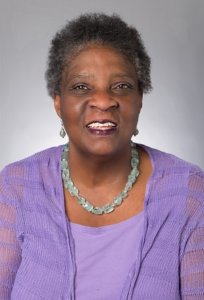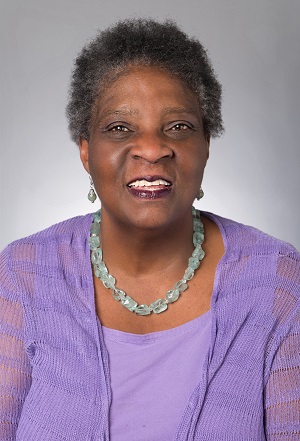An Interview with Eva Paterson, President and Co-Founder, Equal Justice Society
Eva Paterson opens up about her journey as a civil rights lawyer, why working in coalitions is like herding cats, and how she remains a force for good in this moment of Trumpism.
This interview is the twenty-eighth in our series, Black & Bold: Perspectives on Leadership.
Eva Paterson, President and Co-Founder, Equal Justice Society
Fierce. Determined. Divinely guided and protected.
What are some of your career highlights?
There are a couple of them. Early on in my career, I was a legal services attorney. The clients coming for assistance were women who were  being beaten. They would call the police and either they wouldn’t come, or they would side with the batterer. All of the clients were African American women, and I thought this was a violation of the Equal Protection Clause to the Fourteenth Amendment. Black women were not being served. Two years out of law school, I was taking on the Oakland Police Department and ultimately settled the case with a comprehensive approach. We didn’t receive attorney’s fees, but received money to establish a battered women’s shelter in Oakland called Safe Place. All police officers were retrained. It turns out that the arrest avoidance policy was not limited to Black women but was applied to all women. (Eva Paterson pictured at right.)
being beaten. They would call the police and either they wouldn’t come, or they would side with the batterer. All of the clients were African American women, and I thought this was a violation of the Equal Protection Clause to the Fourteenth Amendment. Black women were not being served. Two years out of law school, I was taking on the Oakland Police Department and ultimately settled the case with a comprehensive approach. We didn’t receive attorney’s fees, but received money to establish a battered women’s shelter in Oakland called Safe Place. All police officers were retrained. It turns out that the arrest avoidance policy was not limited to Black women but was applied to all women. (Eva Paterson pictured at right.)
Twenty years later, I gave a talk about that case at a women’s law panel. For the first time, I realized I brought the case on behalf of my mother. My father had some good characteristics but was a batterer. We were an Air Force family and couldn’t call the police on him or his job would be in jeopardy. He later apologized for beating us, noting that he was treated so badly in the military and took it out on our family.
Another highlight was bringing a case against the San Francisco Fire Department to desegregate. Women couldn’t apply and Black men were treated very badly. We combined the lawsuit to include Black men, Latino men, Asian-American men, and women of all races and ethnicities — this was before the concept of intersectionality gained traction. At some points, the gender piece was stronger and carried the case, and in other instances race.
In 1979, I was reading the paper about Mr. Charlie James, an elderly Black man in Hunters Point in San Francisco, who had been shot in his home. I’ve got a good BS detector and something didn’t sound right about how they described what happened. Peter Cohn, a lawyer for the NAACP, was part of the case. This was before the days of CSI (Crime Scene Investigation) where great forensic work happens. I had an architect draw a scale model of the apartment building where Mr. James lived. The Coroner’s report indicated he was laying down when he was shot based on the trajectory of bullets. It turned out he couldn’t walk. We took depositions of some police officers and one was notorious for being really racist. This was before the days of Black Lives Matter, and the officers came armed to their depositions at our offices. The Magistrate mediated the case and we got a great settlement for his family. I didn’t understand the concept of shooting unarmed Black men as a phenomenon at that time, but as #BlackLivesMatter has educated us, I realized that Mr. James (AKA Papa Charlie) was yet another casualty.
The last highlight is a bit wonky. The United States Supreme Court issued Plessy v. Ferguson in 1896. Mordecai Johnson, the President of Howard University, appointed Charles Hamilton Houston as Dean of the Law School. Houston recruited people like Thurgood Marshall, and their legal team used social science to show that segregation gave Whites a false sense of superiority and Blacks a false sense of inferiority. The Equal Protection Clause of the Fourteenth Amendment was passed to give citizenship to recently freed slaves after the Civil War. If Black people apply to be firefighters and one gets the job, while 100 White people apply and 90 get the job, then that’s a statistical disparity. The Supreme Court said that statistical disparity was not enough, and discrimination had to be shown based on intent, not structural racism or unconscious bias. Actions lead to discriminatory outcomes.
Equal Justice Society was founded in 2000. Around the same time, Malcolm Gladwell discussed implicit bias in Blink. Are Lakeisha and Jamal as employable as Brandon and Emily? Resumes with White-sounding names get more callbacks. The intent standard makes no sense, since most people don’t think they are racist yet still have racist outcomes.
I spoke at a conference of federal judges on the topic of why the federal courts were no longer friends to Black people since being taken over by conservatives. Justice Anthony Kennedy was in the room. I received a standing ovation after I laid out how unconscious bias led to racist results. Shortly thereafter for the first time in jurisprudence, unconscious bias was noted in Justice Kennedy’s swing vote on a case related to housing discrimination.
If there was a headline for your leadership journey throughout your career, what would it be?
“Eva Paterson is a fierce warrior who approaches injustice with an open heart.”
What are your favorite types of challenges?
Working in coalitions with people is like herding cats. There are different agendas, egos, different ways of doing things. Racism and gender bias pop up.
I was on a call with a bunch of people, and the first people who spoke were men. They wouldn’t let the women speak. I picked up on that right away and in a nice way called them out. I’ve been trying to protect the Mueller probe. The work is mainly in D.C. where mostly white men are running things. I’m serious and also a joker with a good sense of humor. Initially, the group was dismissive of me, but when I was able to get Sam Waterston from Law and Order to make a video in less than 36 hours, they started listening.
The Artist’s Way talks about “crazy makers.” Agreements will be reached and then they will try to blow up the agreement. Coalitions are the way to get work done. Bayard Rustin called it the “grand coalition.” I like working in coalitions as an activist and in litigation because there are different people with different skills. It can be difficult, with power struggles and unconscious bias, but we are stronger together.
What is one book that was meaningful or influential in your development as a leader?
The most influential book was Simple Justice: The History of Brown v. Board of Education and Black America’s Struggle for Equality by Richard Kluger. This book came out right after I finished law school. I had thought Brown v. Board had just popped up in 1954. There are three parts to the book: the history of Black people in America which talks about everything that has happened to us; the second part is about the strategy of overturning Plessy v. Ferguson which started in the 1930s; and the third part focuses on five cases that went to the Supreme Court and what went on in chambers. It’s a brilliant book that showed me that lawyers can be very strategic.
Work in the social sector can be very personal and linked to one’s values. Can you think of a time when your values were in tension during your career and how you reconciled that tension or not?
The tension was working with difficult people on a common goal and having to reach a resolution. I wanted to have an open heart but didn’t want to be bullied. I witnessed racism playing itself out in the middle of my own work.
What’s your approach to self-care? Are there any rituals you use to survive and thrive?
I’m not really good at it, and I’m sitting here now knowing that I have to write this report and will miss Pilates. I danced this morning and got my blood going. I struggle with my weight, so I’ve gone to a nutritionist, which is changing how I eat. I have hired an assistant who will help me clear clutter from my home. On a spiritual level, that will allow new things to come in.
I’ve been in therapy for many years and it has reminded me to put my own needs first, which is difficult in this moment of Trumpism. I know this is my time. I was feeling so tired several weeks ago when I realized we are at war and I’m a solider. I recently ordered a book about Harriet Tubman to learn how she sustained herself.
I have great friends who celebrate together. I took a five-month sabbatical a year and half ago and finally got to Kenya. It was so wonderful!
I also know that Trump is not going to last forever. I read a tweet that said if you want to know what you would have done in the early days of Nazi Germany, then look at what you’re doing now. The story about the Honduran man who committed suicide after being separated from his child was very troubling…I don’t want to be a “Good German.”
I enjoy a beautiful home with flowers and trees in my back yard. I binge-watch great TV. I try to take care of myself, and it’s really hard these days. I pray, meditate, and am in touch with the ancestors. I remind myself to slow down and breathe; three deep breaths change the energy.
What advice would you offer other Black women trying to develop or amplify their voice and become self-advocates?
Trust yourself. Take chances.
Know that your very existence as an intelligent person is threatening to many people even if they are not aware of it. Don’t take it personally or let it squelch your spirit.
Connect with our ancestors. “We are the hope and dream of the slave.” As bad as things are now, our ancestors would be amazed at what we are able to do.
Take care of yourself.



Comment section